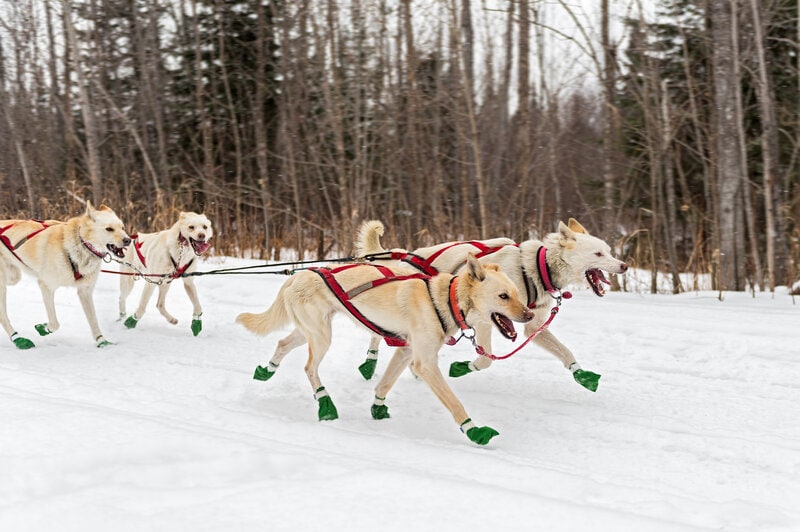Do Australian Shepherds Get Along With Other Dogs?
Updated on
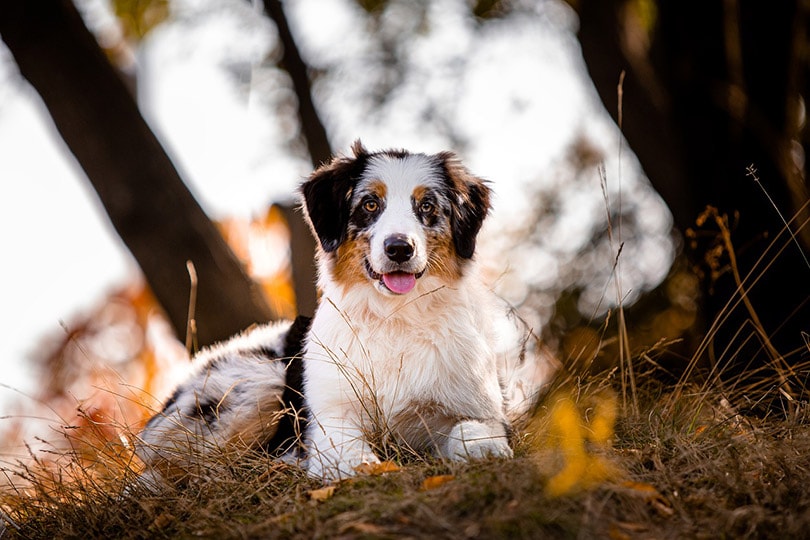
Bringing a new dog into the family is one of the most joyous times in our lives. You get to see your new pet learn the ropes around the house and you get hours of cuddles as you get to know your dog. However, if you already have a dog in the house, an Australian Shepherd, for instance, new introductions can be a bit stressful. When a new pet is brought home, it’s important to know your current dog’s temperament and whether its breed does well with other dogs.
For pet owners who are curious whether their Australian Shepherd gets along well with other dogs, we have the answers for you. In most situations, the Aussie does great with other pets. These dogs were built for herding and are used to being around other animals. They are also a very energetic and friendly breed. This tends to help them make friends with other dogs easily, especially if they are introduced correctly. Let’s learn more about Australian Shepherds and how they interact with other dogs so you can determine whether bringing a new pet into your home with an Aussie is the right decision to make.
What Is an Australian Shepherd?
When encountering an Australian Shepherd most people are immediately struck by the beauty and fun-loving nature of these dogs. Often, their history goes out the window. In reality, this dog breed was created to herd animals and help ranchers. They have a strong work ethic and when not used for helping out around the house or property, need to stay stimulated to keep them out of trouble.
Believed to have originated in the United States, Aussies got their name due to their link to the Basque Shepherd from Australia. It’s the breed’s loyalty to their owner and the hard-working mentality they are best known for, however. You can even find Aussies working as police K9s or narcotic-detection dogs. They also do great in competitions and excel in obedience trials.
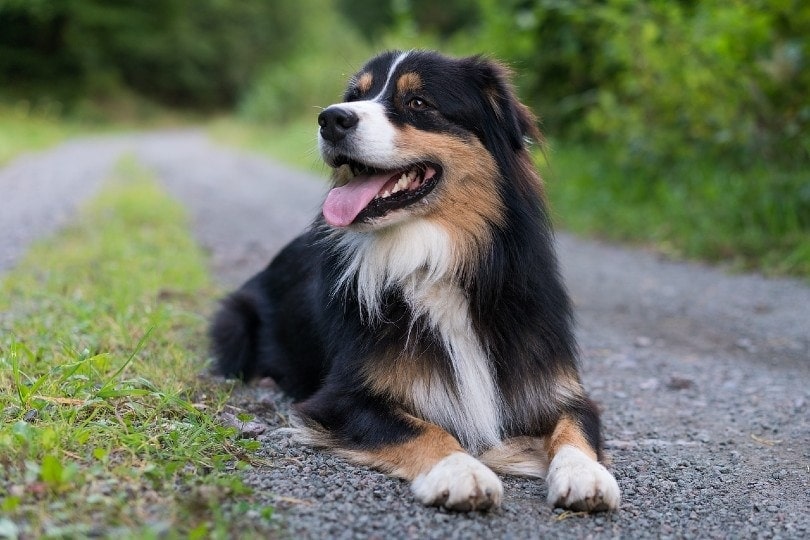
Aussies and Their Families
While they may have been bred as working dogs, Aussies have easily made their way into our hearts and our homes. These gorgeous dogs make ideal pets due to the loyalty they show their families. Aussies do well around children but don’t be surprised if they try to herd the kids and keep them in line. You’ll also find that they can be protective of their families and are quick to alert you if they feel there is danger afoot. The key to a happy life with an Aussie, however, is ensuring they get the exercise and activity they need. These dogs are highly energetic and have herding in their blood. Don’t expect them to be couch potatoes. If they get bored, they could get into mischief around the house and no pet owner wants that.
Aussies With Other Dogs
Considering their easy-going natures, Aussies tend to get along well with other dogs. The key is to properly introduce them. One thing to keep in mind when dealing with Aussies and other dogs is their need to be in control. While they are normally loving and affectionate to their families, including other dogs in the house, they can be a bit bossy. Aussies like to be in control and keep things in order. This is especially true if you haven’t given them a job or an activity to keep them in line.
Other dogs may find your Aussie trying to be the boss and telling them what to do with a nip to the ankle or other signs of a herding mentality. Strong-willed or more aggressive dogs may not take kindly to this and fights may break out. If you truly want your Aussie to have a playmate in the home, it may be best to choose another easy-going or submissive breed that doesn’t mind dealing with an Aussie that wants them to toe the line. This will help avoid tensions while you teach your Aussie how to interact with the new family member.
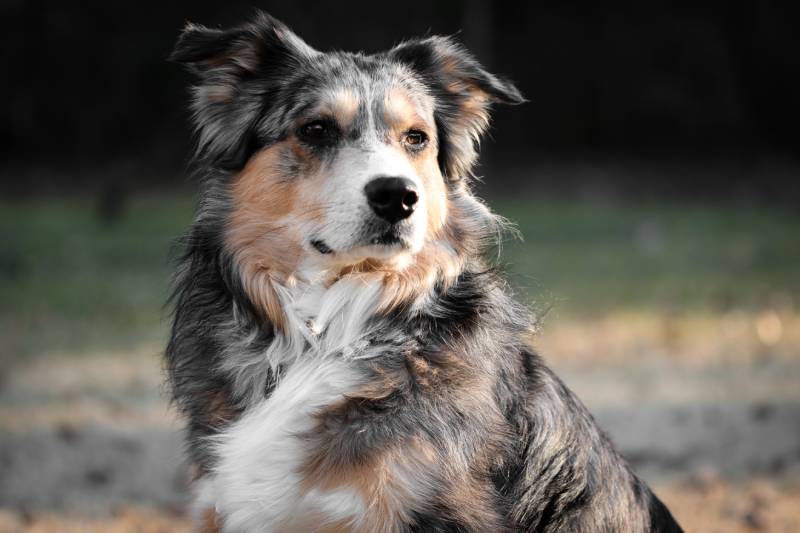
Aussies in a Social Setting
What if you aren’t planning on bringing another dog into your home, but simply want to take your Aussie out for playdates or to doggy daycare? Don’t worry. Your Aussie can still do great if you work with them. If your pet hasn’t been around other dogs, you can follow a few steps to improve their socialization and make them ready for the doggy world. Here are a few tips to help you on your way.
Make Sure Your Aussie Is Properly Trained
Before you can venture out into the world with your Aussie, they need proper obedience training. If your dog doesn’t listen to you, they’ll definitely misbehave when meeting new people and other dogs. Take the time to properly train your Aussie or reach out for obedience training if you don’t feel comfortable doing it yourself. A well-mannered dog does best out in the world and lots of tense situations can be avoided if you have control of your pet.
Start With Walks in the Neighborhood
Taking a walk is not only a great way for Aussies to expel all that energy, but it also helps them get associated with other dogs in your area. As the two of you walk, they’ll pick up on the smells and markings of other dogs. You may even run into a neighbor and their pet who are also out on a walk. This is where you can first judge your Aussie’s reaction.
If you see no aggression, from either dog, introductions can be made but remember to keep them slow. No dog wants a stranger to run up to them. Take your Aussie near the new dog and have them sit. Keep an eye on the dogs to see if they behave. If they do, you can slowly advance the introduction until the pups get the chance to do an initial sniff test and decide whether they want to be friends.
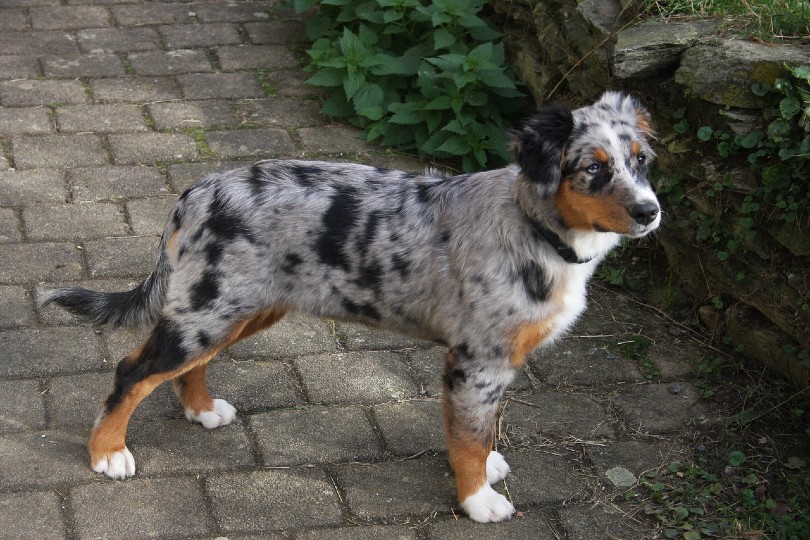
Reward Your Aussie
After any successful interaction while out in your neighborhood, reward your Aussie. This tells your pooch they’ve done a good job and that you’re proud of them. As a working dog, this is important to an Aussie. Use praise and treats to show them how great they’re doing and they’ll try to keep up the good work.
Try a Dog Park
If your Aussie does well around the neighborhood, a dog park could be a great way to get them socialized and interacting with other animals. Keep in mind that the dog park can be overwhelming. Give your Aussie time to get used to all the smells and activities. When you feel they are ready, let them socialize and have a good day making friends.
Can Aussies Be Aggressive?
Unfortunately, any dog can be aggressive. This is why it’s important for you, as the pet parent, to always be on your toes and pay attention to your dog. A situation can arise where your Aussie gets frustrated, scared, jealous, or even tries to take over and be the boss. This is when you should step in and remove your dog from the situation to help avoid confrontation. Also, remember to not take your Aussie into interaction with dogs they aren’t overly familiar with when they aren’t feeling well or are injured. This can have a big effect on their normally friendly demeanor and cause agitation if other dogs try to interact or play rough.
You should also remember that your Aussie is always keeping you and the rest of their family carefully guarded. If your fur baby feels you are in danger, they will alert you to that. If the danger gets too close, in their eyes, they may react. Your Aussie is extremely loyal. Be prepared for situations they aren’t happy with and try to get out of those as quickly as you can.
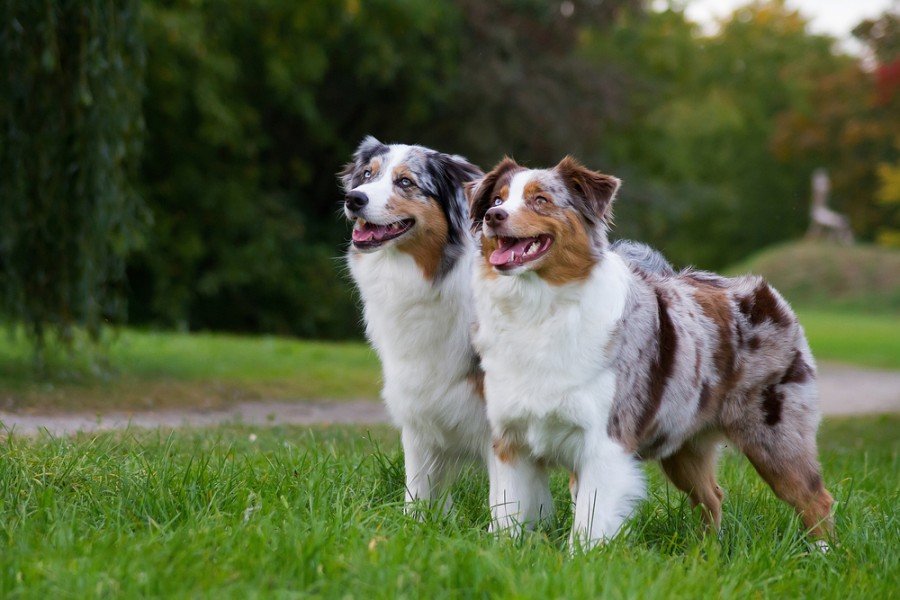
Final Thoughts on Australian Shepherds and Other Dogs
As you can see, Australian Shepherds are great dogs to have as part of the family. These beauties are affectionate, loyal, and full of energy. If you want a playmate for your Aussie, don’t be discouraged. Simply introduce them to new dogs correctly, and you’ll witness your pet in a new world of doggy playtime and enjoyment.
Featured Image Credit: maxxxiss, Pixabay



